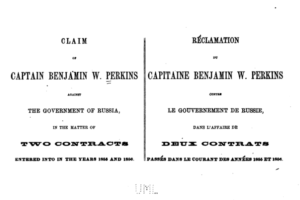by Brock Pate

This project makes use of four main primary sources. The claims of Perkins against the Russian Government constitute the main source for the project.[1] The second source is Benjamin Perkins’ own published work on the claim.[2] The third major source is Anna Perkins’ petition for the claim.[3] Last but not least, the fourth source is a letter sent by the Secretary of State William Seward to Cassius Clay who was the Minister of the United States to Russia.[4] There are many other primary sources that could have been approached, such as letters and official court documents, but due to lack of time and limitations of research during the Covid-19 pandemic, those records remain unattainable.
In the Matter of Benjamin W. Perkins Against the Russian Government is a foundation of this project. Written by Perkins’ lawyer, William Evarts, it details the chronological events of the two agreements that took place with Perkins, de Stoeckl, and Captain Otto Friedrich August Heinrich von Lilienfeld.[5] This book, which is just a lawsuit, allows the reader to gauge the suit for what it was and what it could have been. It tells a history as much as it tells how much money Perkins wanted and lost from Russia. The plethora of information about the underhanded dealings of the Russians in U. S. in and of itself is enough to complete a solid analytical research project.
The claim also tells a little about Perkins, and his life. This source is obviously one-sided though as it was written to sway the minds of the reader to believe Perkins over what Stoeckl and company had pushed to the public. Additionally, this source is the easiest to find between the three, and by far the most widely discussed and analyzed of the three. Perkins really has not been given a fair shake by modern scholars but those that have researched him, lean heavily on his claims against the Russian government.
Perkins’ Claim of Captain Benjamin W. Perkins Against the Government of Russia, in the Matter of Two Contracts Entered into in the Years 1855 and 1856 is the most detailed survey of the story. It consists of around one hundred and thirty-six pages counting the appendix, but each page contains an English inscription as well as a French translation. This is opposed to the shorter page counts of Anna’s petition as well as Evart’s suit that averaged far fewer pages. The increased page number provides a far deeper insight into the topic. This source includes a short recap in the form of a “declaration,” various “exhibits,” as well as the testimonies. This work by Perkins is the definitive story, at least from the Perkins’ side.
The third major primary source is Anna Perkins’ petition for the claims. Once her husband passed away, she took over the case against Russia. It is significantly longer than that of the original claim and consists of much more substance. It promoted the movement through the use of emotion as well as it does through information. Being published after the death of Benjamin Perkins, it included the previous failed efforts to recoup losses.
Aside from Benjamin Perkins’ claims, this document is probably the third most important in finding out how these characters felt about the whole ordeal. The petition was a little more personal in some areas as opposed to the original claim. This document shows the evolution between when the case first started and how it had progressed. This source could probably stand well on its own for a project, but when used in tandem with the Perkins claim and any other primary documents, it works to create a good survey of the situation..
The fourth and final primary source used for this project was a letter sent by Secretary of State William Seward to Minister of the United States to Russia Cassius Clay. This letter is especially important given the stature of the two men in American politics. Clay actively vied for Russian support during the trial. By far the most important part of the letter is when Seward writes that verbal law agreements hold the same weight as written agreements in the U. S.
The National Archives in DC has a significant amount of records on file. However, due to the current pandemic those records were inaccessible.
[1] William Maxwell Evarts, In the Matter of Benjamin W. Perkins Against the Russian Government (Washington, DC, 1860).
[2] Benjamin W. Perkins, Claim of Captain Benjamin W. Perkins Against the Government of Russia, in the Matter of Two Contracts Entered into the Years 1855 and 1856 (G.S. Gideon, printer, 1858)
[3] Anna B. Perkins, The Claim of Anna B. Perkins Against the Russian Governmnet (Intelligencer Printing House, 1867).
[4] William H. Seward (Washington, DC, n.d.).
[5] Otto Friedrich August Heinrich von Lilienfeld (1827-1891), Baltic-Russian staff officer and weapons manufacturer.